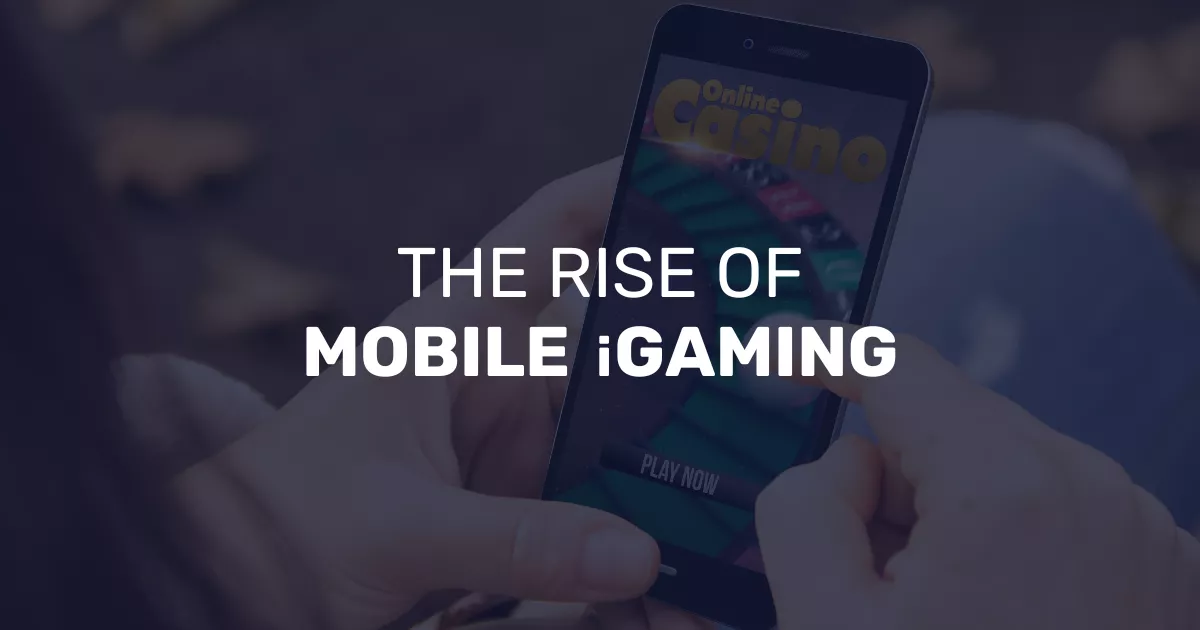Entrevistas e Editoriais
The Rise of Mobile iGaming: Past, Present, and Future

Mobile iGaming has come a long way. From the days of simple, pixelated games to the intricate, immersive experiences we enjoy now, the journey has been remarkable. This article will take you through that journey, highlighting the major shifts and trends in the industry that echo the history of betting. We'll also take a peek into the future, discussing the possibilities and exciting innovations that might soon redefine mobile iGaming as we know it.
Arcades to Apps: The iGaming Evolution #

The transformative journey of iGaming from arcades to mobile apps has been marked by several key phases:
Traditional gaming era: In the 1970s and 1980s, gaming was primarily a physical, communal experience at casinos and arcades, where players competed over games like Pac-Man or casino tables. The simplicity of games and the sense of shared experience were key attractions. Although iGaming as we know it today didn't exist, this era set the foundation for the gaming industry's remarkable evolution, despite technology like advanced personal computers and the internet not being widely available yet.
Home consoles and personal computers: The late 20th century ushered in a new era of convenience in gaming as home consoles and personal computers became popular. Companies like Atari, Nintendo, and Sega introduced consoles for home use, while affordable personal computers facilitated the rise of computer games. This period marked a shift from public gaming venues to private home gaming, although not yet "online", serving as a pivotal step towards digital gaming platforms.
Birth of online iGaming: The internet revolution, coupled with relaxed regulations, sparked the emergence of online iGaming in the mid-1990s. Antigua and Barbuda's Free Trade & Processing Act in 1994 permitted licenses for companies offering internet gambling services. This led to the rise of the first desktop-based iGaming platforms, such as Microgaming, which pioneered the first functional online casino software. Concurrently, secure financial transaction systems developed by companies like CryptoLogic were integral to gaining players' trust.
Rise of mobile iGaming: The smartphone revolution, initiated by iPhone in 2007 and followed by Android, paved the way for mobile iGaming. Early apps like Bet365 and PokerStars surfaced around 2010, offering a limited game range due to early technological constraints. However, the technology advancements later enabled more complex games on mobile. Recognizing the importance of omnichannel in the industry, many iGaming companies embraced a mobile-first approach by the mid-2010s, optimizing games for mobile platforms as mobile users surged.
Through each of these stages, the iGaming industry has effectively harnessed the latest technology trends to improve and reinvent the gaming experience. Today, the iGaming experience is no longer confined by location or time - it is as mobile as our smartphones, accessible anytime, anywhere.
Fueling the Revolution: Key iGaming Trends #

The dynamic nature of the mobile iGaming industry is reflected in the multitude of transformative trends propelling its growth.
Expanded mobile usage: The ongoing surge in smartphone adoption continues to play a vital role in the growth of mobile iGaming. Current data reveals that nearly 7 billion smartphones are in use worldwide in 2023, a figure projected to climb even higher in the coming years. As people increasingly rely on their mobile devices for various activities, including gaming, the mobile iGaming market expands, creating a vast and promising landscape for future growth.
Emerging markets: As mobile technology proliferates globally, new markets in regions like Africa and Latin America are opening up. In Africa, the growing affordability of smartphones and improving internet infrastructure are enabling a rapid expansion of mobile iGaming. In Latin America, regulatory changes are unlocking opportunities for the industry. These emerging markets are presenting fresh landscapes for iGaming businesses to explore.
Shift towards skill-influenced iGaming: Traditionally, gambling has been largely about luck. However, there's an emerging trend of skill-influenced games, especially among younger demographics. These games, where skill can influence the outcome, appeal to a generation raised on video games and offer a fresh twist to traditional gambling games.
Social iGaming: Social iGaming is becoming increasingly popular, particularly among Gen Z players. For this connected generation, gaming is not a solitary activity but a social one. They enjoy sharing their gaming experiences, achievements, as well as live-streaming their games. Mobile iGaming platforms are increasingly integrating social features, turning individual gaming experiences into communal events.
AI and personalization: Artificial Intelligence (AI) is playing an increasing role in iGaming. AI algorithms help tailor gaming experiences to individual players, enhancing engagement and retention. Additionally, AI is being used to create safer gaming environments by detecting potentially harmful behavior and signs of problem gambling and providing tools to promote responsible gaming.
Security and payment systems: With the digitization of financial transactions, secure payment systems have become vital. The rise of cryptocurrencies like Bitcoin has brought about secure, anonymous, and fast transactions. Combined with robust security protocols like end-to-end encryption, the industry is better able to protect user data, enhancing player confidence in mobile iGaming platforms.
These trends underscore the evolving nature of the mobile iGaming industry and the capacity of its business models to adapt and thrive amidst changing technological and demographic landscapes.
Forecasting the Game: Mobile iGaming's Future #

While the future always holds some level of uncertainty, a glance at emerging technologies and evolving consumer preferences hints at potential directions for mobile iGaming.
5G technology: The introduction of 5G is expected to have a transformative effect on the iGaming industry. With its promise of lightning-fast data speeds, minimal latency, and reliable connections, 5G will open up possibilities for more complex and graphically-intensive games on mobile devices. Furthermore, it could enhance the quality of real-time multiplayer gaming experiences, offering seamless, lag-free interactions between players worldwide.
Augmented Reality (AR) and Virtual Reality (VR): AR and VR hold immense potential in the mobile iGaming sector. Although still in their early stages, these technologies are expected to redefine immersion in mobile gaming as they mature and become more accessible. The future of mobile iGaming will likely incorporate AR and VR, blending real-world locations and objects with digital elements to create a distinctive hybrid gaming environment.
Blockchain technology: Blockchain technology has already begun to make its mark in the iGaming world, particularly with the rise of cryptocurrencies. Its potential, however, extends beyond just transactional uses. Blockchain's inherent features of transparency and security could revolutionize aspects of mobile iGaming, from facilitating secure in-game purchases and trading to providing solutions for player identity verification and fraud prevention.
Regulatory evolution: The future of mobile iGaming will also be influenced by changes in regulatory landscapes. Governments worldwide are progressively reassessing their online gambling laws, and these evolving regulations could open up new markets or reshape existing ones. The industry needs to stay adaptable and responsive to these changes.
These emerging trends and technologies hint at a future where mobile iGaming becomes even more immersive, personalized, and widespread. As the industry continues to adapt and innovate, exciting opportunities await both players and iGaming businesses alike.
Wrapping Up #
The explosive growth of mobile iGaming demonstrates the transformative power of technology. With the rise of new technologies, online betting and the ongoing evolution of AI, the future promises even more transformation. As this landscape evolves, companies like NSoft will be at the forefront, fostering a mobile-first approach and personalized gaming experiences.
All stakeholders must remain adaptable to changing regulations and market dynamics. As mobile iGaming enters a new era, it is expected to provide increasingly immersive and tailored experiences, opening up new opportunities for both players and businesses. The industry is on the verge of even more innovation, and all bets are on an exciting future for iGaming.
Tags:
Artigos Relacionados
Entrevistas e Editoriais
03.08.2023.
iGaming’s Social Impact: Responsible Gaming and Gambling Disorder
Join us as we investigate the social impact of iGaming, a rapidly growing industry. While the economic benefits are significant, the increase in problem gambling cannot be overlooked. This article discusses the significance of responsible gaming, the role of iGaming companies and regulators, and the industry's future.
Saiba mais
Notícias / Entrevistas e Editoriais
16.04.2025.
Beyond the Bet: How Gamification is Reshaping Online Gambling
By making the gamification elements fun, relevant, and optional, you ensure that they enhance the betting experience rather than overshadow it.
By Marko Galić, Game Mathematician & Project Manager at NSoft
Saiba mais
Não encontrou o que estava procurando?
Nossa equipe terá o prazer de guiá-lo por nossos produtos e serviços.
Contate-nos